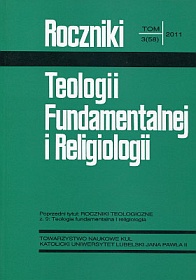Veritative Credibility of the Church in the Light of Hans Urs von Balthasar’s Theological Conception
Abstract
The article analyzes the veritative credibility of the catholic Church according to H. U. von Balthasar. We are trying to answer the question: Does the Church transmit the truth revealed in Jesus Christ in an honest and intact way?
Despite changeable, philosophical and cultural directions the doctrine and moral rules of the Church remain constant and in accordance with ecclesiastical tradition. Christianity creates its credibility trough consequent interpretation and proclamation of the Divine Word. The Church interprets mysteries revealed by God in an infallible way, cares about the Biblical canon, meditates on Divine books, explores them and lives according to them. Existence of the ecclesiastical office eliminates attempts of subjective and incorrect understanding of the revelation. The Church fulfils its veritative mission with help of theology, which reads the Divine revelation in new contexts. Church's veritative credibility is created also by the liturgy which makes saving work present and shows the God's Revelation as something living and dynamic. Compatibility between confessed faith and life is the greatest argument for authenticity and credibility of the Church. The revealed truth shows its beauty and power in acts of charity and love.
References
Balter L.: Teologia. W: Leksykon Teologii Fundamentalnej. Red. M. Rusecki i in. Lublin−Kraków: Wyd. „M” 2002 s. 1228-1235.
Balthasar H. U. von: A theological anthropology. New York: Sheed and Ward 1967.
Balthasar H. U. von: Epilog. Tł. J. Zychowicz. Kraków: Wyd. WAM 2010.
Balthasar H. U. von: Prawda jest symfoniczna. Aspekty chrześcijańskiego pluralizmu. Tł.I. Bokwa. Poznań: Wyd. W Drodze 1998.
Balthasar H. U. von: Teologika. T. 3. Duch Prawdy. Tł. J. Zychowicz. Krakówy: Wyd. WAM2005.
Balthasar H. U. von: Theologie und Heiligkeit. „Internationale Katholische Zeitschrift «Communio»” 16(6):1987 s. 483-490.
Balthasar H. U. von: W pełni wiary. Tł. J. Fenrychowa. Kraków: Wyd. ZNAK 1991.
Benedykt XVI: Encyklika Deus caritas est. Watykan 2005.
Congar Y. M. J.: Wierzę w Ducha Świętego. T. 1. Duch Święty w „ekonomii”. Objawienie i doświadczenie Ducha. Tł. A. Paygert. Warszawa: Wyd. Księży Marianów 1995.
JustynMęczennik: Apologia. W: M. Michalski. Antologia literatury patrystycznej. T. 1. Warszawa: Instytut Wydawniczy PAX 1975 s. 91-99.
Katechizm Kościoła Katolickiego. Poznań: Pallottinum 1994.
Ledwoń I. S.: „…i nie ma w żadnym innym zbawienia”. Wyjątkowy charakter chrześcijaństwa w teologii posoborowej. Lublin: Wyd. KUL 2006.
Morales J.: Wprowadzenie do teologii. Tł. P. Rak. Kraków: Wyd. „M” 2006.
Napiórkowski S.: Kolegialność. EK. T. 9 kol. 322-324.
Rakocy W.: Natchnienie biblijne. LTF s. 828-830.
Ratzinger J.: Duch liturgii. Tł. E. Pieciul. Poznań: Klub Książki Katolickiej 2007.
Ratzinger J.: Kościół pielgrzymująca wspólnota wiary. Tł. W. Szymona. Kraków: Wyd.„M” 2005.
Rusecki M.: Traktat o Objawieniu. Kraków: Wyd. Księży Sercanów 2007.
Seweryniak H.: Świadectwo i sens. Teologia fundamentalna. Płock: Płocki Instytut Wydawniczy 2001.
Sobór Watykański II: Konstytucja dogmatyczna o Objawieniu Bożym Dei verbum (1965).
Sobór Watykański II: Konstytucja duszpasterska o Kościele w świecie współczesnym Gaudium et spes (1965).
Sobór Watykański II: Konstytucja o liturgii świętej Sacrosanctum Concilium (1963).
Św. Augustyn. Wyznania. Tł. Z. Kubiak. Kraków: Wyd. ZNAK 2003.
Teilhard d e Chardin P.: Rozum i wiara. Tł. M. Tazbir, K. Waloszczyk. Warszawa: Instytut Wydawniczy PAX 2003.
Copyright (c) 2011 Roczniki Teologii Fundamentalnej i Religiologii

This work is licensed under a Creative Commons Attribution-NonCommercial-NoDerivatives 4.0 International License.

